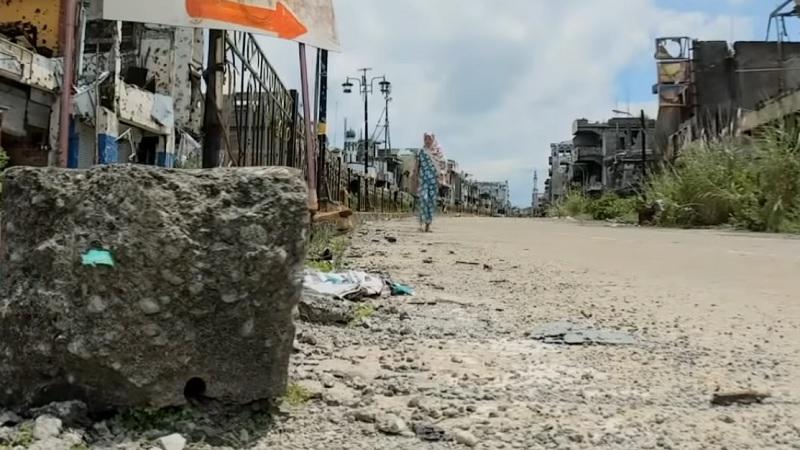Group says there is 'no real liberation to speak of' in Marawi, laments slow reconstruction

A monitoring group lamented on Saturday the slow reconstruction of Marawi City and said "there is no real liberation to speak of."
"It has been three years since the government declared our city liberated, but there is no real liberation to speak of. Most of us have not been allowed to return to our homes and rebuild our lives. There has been no compensation for the damages to our personal properties. Thousands of us remain in shelters and housing projects in dire conditions, with sanitation and the supply of basic utilities wanting," the Marawi Reconstruction Conflict Watch, an autonomous monitoring group, said in a statement.
The group gave the statement on the occasion of the anniversary of the liberation of Marawi from the Maute group terrorists with ties to the Abu Sayyaf and ISIS.
The MRCW said development is slow, and funds are not enough for the reconstruction of the city.
"Even if some have benefited from what has been achieved so far, the majority of our people haven't. The sad fact remains that progress is slow, funds are lacking, and implementation could be improved," it said.
"We are fractured, and restoring relationships is difficult when we cannot even meet our basic needs adequately. This continues to fuel despair and frustration that threaten the fragile peace in our communities," the group added.
The MRCW said the conflicts may worsen due to tensions over land and property rights.
"Tensions rise over land and property rights as reconstruction activities start. These may worsen existing identity-related conflict and may trigger violent flashpoints and a stringing of conflict – a situation ripe for the resurgence of violent extremism, the thing that the government declared we have been liberated from," it said.
The MRCW added that the House of Representatives approved on third and final reading the proposed 2021 national budget amounting to P4.5 trillion. It was approved on October 16, "on the eve of the third anniversary of the so-called liberation of Marawi... as the government urged for the 'rebound, reset and recovery' from the adverse impact of COVID-19."
However, it said that families and whole communities are still living in shelters amid the COVID-19 pandemic.
"But what about the displaced families and entire communities in Marawi who continue to live in shelters, shouldering the heavy burden and constant risk of virus infection and the stigma of being Muslims, of being displaced, and worse, of being associated with terrorists? Recent data from the Provincial Inter-agency Task Force showed that the province of Lanao del Sur has logged a total of 697 confirmed COVID-19 cases as of September 30 of which 354 (50%) are from Marawi. Moreover, 111 (72%) of the 153 active cases are from the city. The impact of the COVID-19 pandemic adds another layer to our hardship and suffering and reinforce existing vulnerabilities, threats, and risks," it said.
The MRCW asked if the government can still make good on its promise to make the city prosperous again.
"As of August 2020, the government has only released ?22.2 billion for the rehabilitation of Marawi. This is barely half of the total funding requirement of the project which stands at ?60.5 billion. The dismal amount on top of issues on disbursement and absorptive capacity in the past paint a bleak picture for us all. With only 16 months left until the 2021 year-end deadline of completing reconstruction projects, can the Duterte administration still deliver its promise that Marawi will rise as a prosperous and peaceful city again?" it said.
"Three years have passed and it has become clearer that we have not been truly liberated," the MRCW added.
Meanwhile, as it commemorated the liberation of Marawi, the Armed Forces of the Philippines (AFP) on Saturday said the crisis serves as a reminder that the anti-terrorism campaign should also include prevention, and not just be focused on combat.
"The Marawi Crisis reminds us that the vigorous campaign should not be focused only on combatting terrorism but more importantly in preventing the menace from invading our communities and cities," the AFP said in a statement.
The AFP said it is committed to continuing the fight against terrorism.
"The AFP joins the nation and our people in the continuing fight against terrorism. This is highlighted by the tragic beginning and end of the Siege of Marawi that we commemorate today," it said.
In May 2017, the Maute group inspired by ISIS laid seige to Marawi City.
It took 21 weeks of unrelenting fighting by government troops to put an end to the siege, after the rebels' leaders, Omarkhayam Maute and Abu Sayyaf leader Isnilon Hapilon, were killed.
READ: Timeline: Marawi: From eruption of conflict to a declaration of liberation
—KG, GMA News



